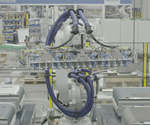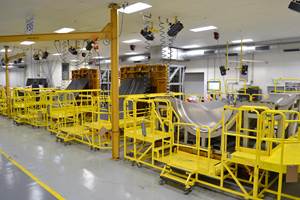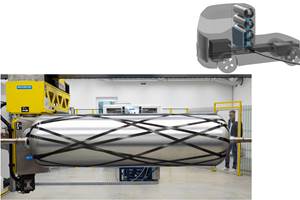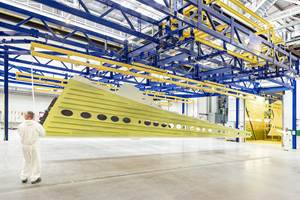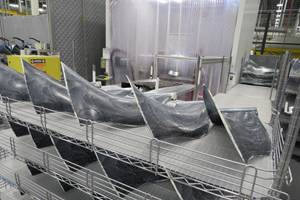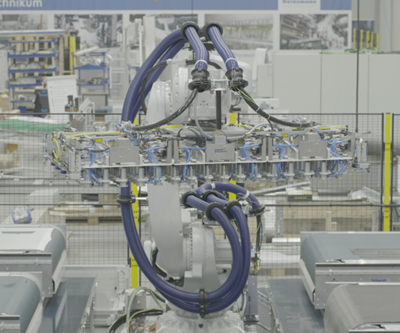Boeing to resume commercial airplanes production in Puget Sound
After temporary suspension due to COVID-19, Boeing plans to resume Washington state production facilities in a phased approach starting April 20.
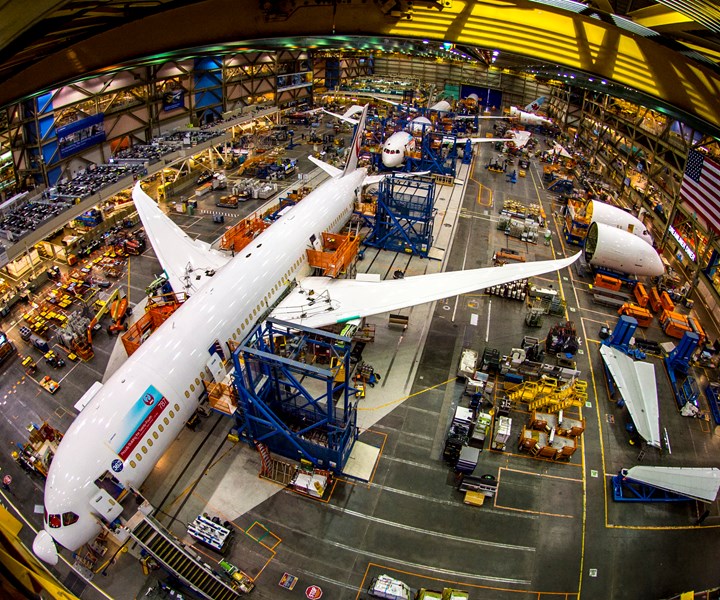
Boeing 787 facility in Everett, Washington, U.S. Source | Boeing
On April 16, Boeing (Chicago, Ill., U.S.) announced that starting the week of April 19, it will resume all commercial airplanes production in a phased approach at its facilities in the Puget Sound region of Washington state. The aircraft manufacturer suspended operations at these facilities last month in response to the COVID-19 pandemic.
The company reports that it has taken extra precautions and instituted comprehensive procedures to keep employees safe and fight the spread of COVID-19 at all of it sites.
According to Boeing, approximately 27,000 people in the Puget Sound area will return to production of the 747, 767, 777 and 787 programs, supporting critical global transportation infrastructure, cargo services and national defense and security missions. The 737 program will resume working toward restarting production of the 737 MAX. Boeing South Carolina remains in a suspension of operations as of this announcement. Boeing reports that it has already restarted mostly defense production operations in the region with approximately 2,500 people.
“This phased approach ensures we have a reliable supply base ... and we have all of the necessary safety measures in place to resume essential work for our customers.”
Employees in the Puget Sound region working on the 737, 747, 767 and 777 programs will return as early as third shift on April 20, with most returning to work by April 21. Employees for the 787 program will return as early as third shift April 23, with most returning to work by April 24, Boeing says.
“The health and safety of our employees, their families and communities is our shared priority,” says Stan Deal, president and CEO of Boeing Commercial Airplanes and senior executive in the Pacific Northwest. “This phased approach ensures we have a reliable supply base, our personal protective equipment is readily available and we have all of the necessary safety measures in place to resume essential work for our customers.”
The company’s practices reinforce enhanced cleaning, employee health and physical distancing in partnership with employees. Aligned with federal and state guidance, these practices include:
- Staggered shift start times to reduce the flow of employees arriving and departing work
- Visual controls such as floor markings and signage to create physical distance
- Face coverings will be a requirement for employees at Boeing sites in Washington. Employees are strongly encouraged to bring in their own procedural mask or face covering; those who do not have a mask available will be provided with one.
- Providing required personal protective equipment to employees working in areas where physical distancing cannot be maintained for an extended period
- Asking employees to perform self-health checks before coming to work and to stay home if they are ill
- Employee wellness checks at the beginning of every shift and voluntary temperature screening at many manufacturing locations
- Contact tracing when an employee tests positive for COVID-19 to reduce risk to teammates
- Continued virtual meetings and employees who can work from home will continue to do
- Transportation and common areas adjusted for physical distancing
- Hand-washing stations in high-traffic areas and additional cleaning supplies available
Enhanced measures will continue until conditions allow for a return to regular work and cleaning processes, Boeing says.
Related Content
Plant tour: Middle River Aerostructure Systems, Baltimore, Md., U.S.
The historic Martin Aircraft factory is advancing digitized automation for more sustainable production of composite aerostructures.
Read MoreCryo-compressed hydrogen, the best solution for storage and refueling stations?
Cryomotive’s CRYOGAS solution claims the highest storage density, lowest refueling cost and widest operating range without H2 losses while using one-fifth the carbon fiber required in compressed gas tanks.
Read MorePlant tour: Spirit AeroSystems, Belfast, Northern Ireland, U.K.
Purpose-built facility employs resin transfer infusion (RTI) and assembly technology to manufacture today’s composite A220 wings, and prepares for future new programs and production ramp-ups.
Read MorePlant tour: Albany Engineered Composites, Rochester, N.H., U.S.
Efficient, high-quality, well-controlled composites manufacturing at volume is the mantra for this 3D weaving specialist.
Read MoreRead Next
Composites suppliers, fabricators respond to coronavirus
Companies across the composites industry supply chain share how the COVID-19 pandemic is affecting their businesses, and how they are available to help.
Read MorePlant tour: Daher Shap’in TechCenter and composites production plant, Saint-Aignan-de-Grandlieu, France
Co-located R&D and production advance OOA thermosets, thermoplastics, welding, recycling and digital technologies for faster processing and certification of lighter, more sustainable composites.
Read More“Structured air” TPS safeguards composite structures
Powered by an 85% air/15% pure polyimide aerogel, Blueshift’s novel material system protects structures during transient thermal events from -200°C to beyond 2400°C for rockets, battery boxes and more.
Read More
.jpg;width=70;height=70;mode=crop)
